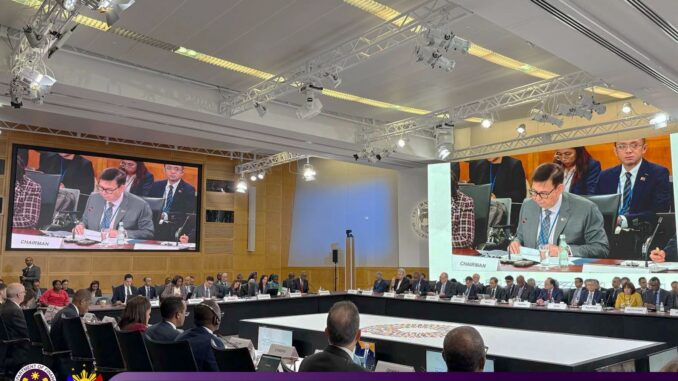
Finance Secretary Ralph Recto, current chair of the Intergovernmental Group of Twenty-Four (G-24) Board of Governors, pushed for key reforms to empower the International Monetary Fund (IMF) and the World Bank Group (WBG) to better serve developing countries.
“We continue to call for a more agile and resolute IMF and World Bank. We need you to not only keep pace with the changing times but also lead with foresight and innovation. We need heightened development cooperation, scale-up support, and more responsive solutions to navigate the headwinds and foster peace, stability and prosperity for all,” Recto said during high-level meeting of ministers and governors on Oct. 22, 2024 at the IMF headquarters in Washington D.C.
Formed in 1971, G-24 helps coordinate the positions of developing countries on international monetary and development finance issues to ensure that their interests are adequately represented in negotiations on international monetary matters. The Philippines serves as the chair of the G-24 Bureau for 2023-2024.
With the theme, “Bretton Woods System at 80: Historical and Emerging Challenges and Options for Reform”, the high-level meeting aimed to facilitate discussions on essential reforms of the System to address the global challenges faced by emerging markets and developing economies.
“Today is an extremely different world. Financial interconnectedness, digital disruption, widening inequality, climate change, and geopolitical tensions are reshaping the global order. Any slowdown in the global economy because of these uncertainties and new economic realities is bound to hit developing countries the hardest,” Recto said.
Recto underscored the need for the IMF to create a new liquidity provision mechanism to further support countries with sound fundamentals in times of liquidity crises.
He said to meet its mission of eradicating poverty on a livable planet, the World Bank Group should set more ambitious goals for its concessional and non-concessional windows, commensurate with the challenges of achieving inclusive and sustainable development by 2030.
Recto said the Sovereign Debt Resolution Framework should also be reformed to deliver comprehensive, predictable, swift, and impactful debt relief, addressing the urgent needs of vulnerable.
He said governance and institutional reforms of the Bretton Woods System should be accelerated to increase the voice and representation of developing nations.
“Without improvements and bold actions, decades of individual and global efforts to eradicate poverty and inequality, combat climate change, and invest in growth-enhancing projects will be put to a halt, if not reversed. Thus, we are counting on this meeting to set an unprecedented multilateral cooperation and action,” Recto said.
IMF managing director Kristalina Georgieva and WB Group senior managing director Axel van Trotsenburg shared the institutions’ respective programs aimed at providing wider access to concessional financing and supporting developing countries in sustaining productivity, enhancing long-term growth prospects, and increasing resilience to economic shocks.
Argentina will serve as the next chair of the G-24, and Pakistan as the next second vice-chair and incoming bureau member.
G-24 now has 29 members, including Algeria, Argentina, Brazil, China, Colombia, Congo, Cote D’ivoire, Ecuador, Egypt, Ethiopia, Gabon, Ghana, Guatemala, Haiti, India, Iran, Kenya, Lebanon, Mexico, Morocco, Nigeria, Pakistan, Peru, the Philippines, South Africa, Sri Lanka, Syria, Trinidad and Tobago and Venezuela.


Be the first to comment